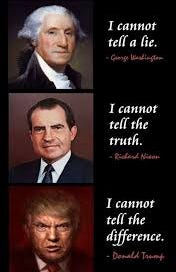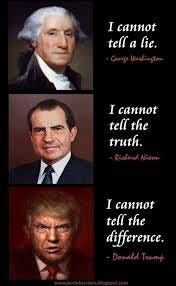Abuse of Office, Dignity of Office, and Presidential Historians
Following up on my most recent paywalled post, on a Times piece that mis-applied the thinking of Patrick Henry to the U.S. presidency’s dangerous potential for establishing a tyranny. I focused there on the failure to take founding-era politics seriously—in a major piece purporting to fill us in on the founders’ thinking!—and the concomitant misconstruals that have made leaning on national history so useless in confronting the grim national challenge posed by Trump and Trumpism.
But there’s a related weird angle in that Times piece—and it’s related as well to my latest public post, on Adam Schiff and Alexander Hamilton.
At the end of the Times piece, Peter Baker, the writer, returns to the nationally historic impact of Trump’s criminality:
Mr. Trump has proved that pushing ahead relentlessly regardless of scandal, investigation and trial can work for him politically—at least so far. He is on track to win the Republican presidential nomination for a third time and has at least an even chance of beating Mr. Biden to return to the White House. If he does, he will set a new standard for what is considered acceptable in a president.
It goes without saying that Trump’s nomination as the Republican candidate will be the first time a convicted felon has held that position; if he’s re-elected president, that will of course be a first too. I don’t possess the degree of certainty that would allow me to predict those awful events’ setting a whole new standard. To me, history has never worked that way: unforeseen complications and ironies tend to rule instead.
More important is how Baker frames not his future predictions but his look-back at the nation’s past.
To make his point, he brings in the historian Lindsay M. Chervinsky, the incoming executive director of the George Washington Presidential Library at Mount Vernon and the author of The Cabinet, on Washington’s creation of the cabinet as an institution, as well as a forthcoming book on John Adams’s presidency. Right after the section I quoted above, Baker concludes his piece by quoting Chervinsky, on Trump’s conviction:
“I think my biggest takeaway is how lucky we’ve been as a nation to have presidents who have mostly comported themselves with dignity, or at least respected the dignity of the office. . . . This conviction brings into stark relief how violently Trump has rejected that tradition.”
If we’re really talking about the presidency’s potential for becoming despotic, there’s a confused equation at work here—it may be more Baker’s than Chervinsky’s, I don’t know—between a president’s respect for the dignity of the office and a president’s staying within the bounds of law-abiding republicanism and not threatening to institute authoritarianism. The idea seems to be that Trump’s manifest absence of any sense of the office’s dignity—or any other kind of dignity—inspires him to cross a boundary into overassertions of power, a boundary that presidents with a greater sense of dignity have traditionally observed.
But while it’s true that no other former or potentially future president has been a convicted felon, Trump’s maniacal trashing of all known norms of respect was key to his success well before he was convicted of a crime. So, just for one thing, as far back as 2016, a total lack of interest in anything that a presidential historian is likely to see as the dignity of the office was already a hallmark of the attitude of the whole Republican Party and, maybe more importantly, the attitude of a big segment of the electorate.
Regarding the longer-range history of the presidency, it seems to me that multiple self-canceling contradictions prevail in any proposition that would equate a high regard for the dignity of the presidency with avoiding authoritarianism. To look at it from the less ruly side, few see Bill Clinton’s sexual behavior before and during his time in office as doing much to maintain the dignity of the office. In that sense, he’s a Trump precursor. But few see him as attempting to make himself the head of a police state. In that sense, he’s not.
From the opposite angle, few presidents have had greater regard for official dignity than George Washington and John Adams, and their administrations carried out policies that many scholars see as dangerously authoritarian, as did many people at the time. Washington believed that the Constitution protected no right of association. To him, therefore, any organized, durable political opposition—anything beyond a one-off protest against a given law—represented a tendency toward insurrection and should be shut down. He wanted to prosecute people who held meetings, signed petitions, and organized protests and was restrained not by his republican commitments but by his Attorney General, Edmund Randolph, who refused to pursue such tactics.
The Adams administration, successor to Washington’s, became the driver and supporter of an intense militarization of the country, which dovetailed with Congres’s passing laws giving the president a power to deport, at his discretion, any non-citizen he considered dangerous and defining any criticism of administration policies as sedition. Timothy Pickering, Adams’s Secretary of State, scoured newspapers looking for editors to jail. Washington, in retirement, thought the only problem with those laws was that they didn’t go far enough.
These deeply authoritarian tendencies in our first two presidencies were founded in large part on the presidents’ sense that their office was being disrespected—that the dignity of the presidency had to be protected and preserved, that all criticism of presidential authority, illegitimate by definition, had to be fended off on behalf of public order. An excessive regard for the dignity of the office, in those cases, equated with and rationalized anti-republican policies.
Trump is categorically different. His open, theatrical, even festive disregard for any restraint at all speaks to a lot of Americans, obviously, and he’s so adept at confusing the aesthetic with the political, to such destructive ends, that even the most informed observers and resisters can end up confusing them too.



